
Grandchildren
Following are short memorial stories about some of the grandchildren of the people that are the focus of this site. So the people mentioned here are actually parents, uncles, aunts, etc. to me.
Velma Bates

Velma was born in late 1921 in a small town in southwestern North Dakota. She was the first child born to Harry Bates and Marian Loy. Subsequent children were Shirley and Dennis. Harry had come to the region with his mother and some sisters in about 1905 from Brodhead, Wisconsin. Marian lived in the vicinity of Lemmon (SD), having moved there with her family from a farm near Mound City (SD). How Marian and Harry met is unknown to me.
The Bates family moved to various locations near Hettinger (ND) and Lemmon (SD) as Harry found work. Eventually, they settled on a farm near the north fork of the Grand River in South Dakota. Velma remembered this part of her life right up until her death. Memories included going to a one-room school (the Green Cabin School), neighbors, a dugout that they had prepared in the event of tornadoes, taking care of her sister, Shirley, her dog (Jack), visiting maternal and paternal grandmothers, etc. I have to mention that her maternal grandmother (Anna Loy) was revered for her kindness. Some pictures from this era survive.
In truth, this was not very good farm land, and it must have been hard for Harry, who had lost his right arm in about 1900 in an accident in Wisconsin. In the midst of the depression, the family moved from their homestead in Perkins County (SD) to Gettysburg (SD), where they operated so-called camping cabins and a Texaco gas station.
At the insistence of her mother, Velma attended what was then known as Northern State Teacher’s College. Because of finances, she was only able to attend for two years, but she was able to return to Gettysburg, where she taught in one-room schools. She taught at one school south of Gettysburg. It was in Gettysburg that she met Robert Rhombs, who she eventually married in 1945 (shortly after he returned from WWII).
After marrying Robert, they moved to Aberdeen (SD) where Robert attended school on the GI Bill and managed a dorm for veterans. After graduation, work took Robert and Velma to Iowa, where they lived in Ft. Dodge and Des Moines. Their first child, Craig, was born there.
To pursue advancement, they moved to Minneapolis, where their second child, Pamela, was born. They lived there for about six years, and work then took the family to Ft. Lauderdale (FL), where they developed good friends and memories. It was a sign of the times that people moved for advancement, and so the family then moved to Atlanta (GA). Velma never felt fully at home in “the South”, but she did an exceptional job of creating a warm home and made sure that her children were provided with nice clothing.
The years in Atlanta were marked by an assortment of life-changing events. Both children went off to college, Robert had a heart attack, etc. They left this location and period of their lives behind and moved to Sarasota (FL), where Velma maintained an attractive/comfortable house and supported Robert through a series of health problems that ended in his death.
Unfortunately, as time passed, it became necessary for Velma to move to an assisted living facility, near Pam in Punta Gorda (FL). She lived there with her wonderful cat (Booger) until her death in 2019.
It does not come out in this narrative, but Velma (like her favorite grandmother, Anna Allen) was a sweet and kind soul, who will be missed and remembered fondly.
Following is a collage of pictures that show Velma at various stages of her life.
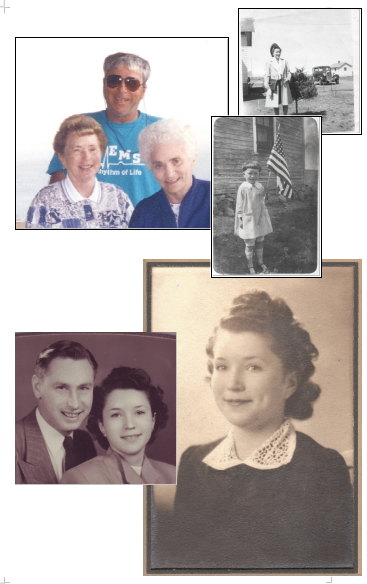
Robert Rhombs
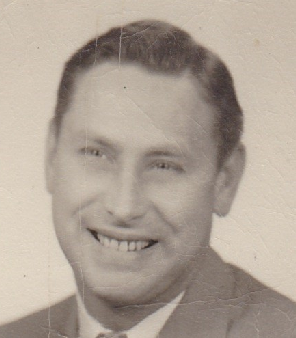
Robert was born in 1920 in rural Potter County, South Dakota, to Tena (Thompson) and Joseph Rhombs. He was the youngest of three children, the others being Anna and Vern. He was born at the farm of Ole and Caroline Thompson, his maternal grandparents that lived just west of Hoven. In the spring after his birth the family moved to their own farm south of Lebanon, where his father (Joe) and his uncle (Nick) had built a house that is still occupied today.
His education began at Roy School, south of Lebanon. He attended High School in Lebanon, where he did well academically and enjoyed baseball and basketball. On the farm, he was especially fond of the animals, with his favorite probably being a horse named Dotty. Because of the depression and drought, he was for a while "enlisted" in the CCC camp near Pierre to help bring in some additional income. After high school, he attended Northern State College in Aberdeen long enough to be able to teach at rural schools (e.g., the Sanner School just west of Gettysburg). However, he was drafted into the Army at the end of World War II, where he served in the European Theater of Operations as a first sergeant in the Army’s 95th Infantry Division. He was awarded a number of medals in spite of the fact that he loathed military discipline.
After the war he married Velma Bates. They moved to Aberdeen, where he finished a Bachelor's degree at Northen State while managing Quonset housing for vets. Once finished there, he and Velma moved to Ft. Dodge, IA, and then Des Moines as he began a career in sales. His career with subsidiaries of Alcoa lasted for over 40 years and took him and his family to Minneapolis, Ft. Lauderdale, and Atlanta. At the time of his retirement, he was the Southeast Regional Sales Manager for WearEver. He was a member of the Masons.
After retirement he pursued travel as a part-time business, and he led trips to Europe for veterans to revisit locations like Metz that they had seen during combat. He had also enjoyed raising Gelbvieh cattle in Georgia. As reported above, he and Velma retired to Sarasota, FL, where he died.
So, what was he like? - Robert approached many of life’s experiences as struggles, and indeed most were - growing up poor, WWII, career, & various health problems that eventually brought him down. These are common struggles. The special things that he brought to these were fearlessness and courage.
Friendship was of extreme importance to Robert. I think that he desperately sought friendship. Even in his business dealings I know that he preferred a verbal agreement and a handshake to written agreements. He wanted customers and business colleagues to be friends too. He had many long friendships, not the least of which is the special one with my Velma which lasted more than 60 years.
I offer some stories told by others. These may help describe the personality of Robert (and to a lesser extent his wife, Velma). -
Boxer Shorts (from Dale Barnes)
"From time to time, your Dad and I would travel out of town together and in doing so we would be back and forth in each other’s room. I remember the first time I saw you Dad’s freshly ironed boxes in his suit case, and then one day he answered the door in his perfectly ironed boxers. In each case I really had to laugh. Of course I had to make a request back at home for similar service, but it fell on deaf ears. I wonder what ever happened to that special heated roller style ironing contraptions that your Mom used. There has to be very special relation between a man and a woman when she irons his shorts. I have never known of another case like this. All these years later this still makes me smile."
Missing Suit Coat (from Dale Barnes)
"There was a trade show that your Dad and I attended down town at a local hotel. As I recall it was a distributor of ours that was having a local shown and we Wear Ever guys were showing our wares. We had people in and out of our room all day long and back then a lot of people smoked. As I recall, at the end of the day we all retired to the hotel bar for a few drinks and there was more smoke in the air. I am not sure of the time that we finally headed home; but I do recall that I was driving and dropped him off at his house. Early the next morning, and I do mean early, as your Dad never slept in late, my phone rang and he was in a panic wanting to know if he had left his suit coat in my car. After a quick check of my car, I had to report that it was not there. By this time, he was in a true panic and I was not aware that this was a brand new suite that he had just purchased the same week of the show. He was trying not to let your Mom know that it was missing and panic was setting in since he knew she would be furious if he had lost the coat. The only option seemed to be that he had left it at the hotel bar so we quickly developed a plan for me to pick him up and to head back to the hotel in an attempt to recover the suit coat. And, then just before I was to walk out the door to leave to pick him up he called back. At the very last moment, your Mom spoke up……………..she had let him squirm knowing all along that she had hung the coat was out on the porch since the coat smelled of smoke she did not want it in the house until it aired out. I am can only assume that she must have enjoyed watching him sweat and squirm. Looking back on this I have laughed many, many times."
The One that Got Away (from Gus Heffner)
"One story that I might add would be the time your Dad along with myself and two others went Marlin fishing in Florida. Your Dad finally caught a Marlin which he had wanted to do for many years. The fish came out of the of the water and "danced" a couple of times, you have seen pictures such as this. Well the boat captain goofed bad and instead of cutting back on the throttle to slow the boat, he pushed forward and increased the speed. Before he could correct his mistake, the increased pressure on the fishing line caused the line to be pulled out of the Marlins mouth and it escaped. Your Dad was so mad at the Captain that he wanted to knock him overboard. I got between them and the Captain went back fast to his seat and stayed away from Bob the rest of the trip. Bob was very unhappy not to land the Marlin and the rest of us felt sorry for him too. I have never forgotten this fishing trip. He and I discussed it several times over the years."
Card Tricks (from Robert Comeau)
"In August of 1991, we celebrated my mother’s 80th birthday at our lake home. We called it “Annie Days” and all the Comeau’s, the Rogers’ and the Rhombs’ traveled to Park Rapids, MN to help celebrate. We all had a wonderful time together.
On one of the days, Bob Rhombs and our son, Brent, who was 11 at the time made a makeshift card table in the breezeway out of Coleman coolers. Bob proceeded to show Brent how to do card tricks. Brent was fascinated.
Years later after Brent graduated from college, he became a high school band director. Sometimes on band trips he would walk to the back of the bus and spot some kids playing cards. He would say “give me those cards”. He would then take the deck of cards and shuffle them and say, “pick a card, any card”. Kids would be amazed when Brent picked the right card every time. "
Outwitting a Supervisor (from Robert Comeau)
"Many years ago, when I was still in college, I was visiting Phyllis and Dale in Lemmon S.D. and we attended a dance at the local Legion Club. During the course of the evening Phyllis introduced me to a gentleman and told me “this man knows our Uncle Bob”. The man laughed and said, “the next time you see Bob Rhombs, ask him why he made $5 a month more than I did while we were teaching school together in Potter County”. So, I did, and this is how the story unfolded.
Like most people of the time Bob Rhombs was struggling financially while he was attending Northern Normal (now Northern State University) in Aberdeen. Annie would send him money from time to time from her high paying teaching job ($30 a month), but by the end of his Junior year he was unable to put enough money together to return. Determined to finish college, Bob devised a plan.
I those days you could teach in a one room school like my mother did with only one year of college, so he was actually overqualified to teach. So, he contacted the Potter County School Superintendent. It was late in the summer and Bob knew that there was one school job that was vacant in southern Potter County. And it was vacant for a reason.
At that time education was not a priority to farmers and farm work came first. As a consequence, several of the boys attending this school were past their teens and not the “brightest bulbs on the Christmas tree”. It was no wonder the position was still open with school about to start.
When Bob met with the superintendent, he told him he would take the job on two conditions: He would be paid $5 a month more than the other teachers in the county and the superintendent was not to make his school visit until after Christmas. The superintendent agreed and Bob accepted the job.
On the first day of school Bob asked the students “how many of you like to play baseball”. Bob loved baseball and there were really not many options for entertainment for the kids back in those days. Of course, everyone’s hand flew up and he told them if they would get to school on time every morning and get their work done by noon, they would choose up teams and play baseball for the rest of the day. The kids thought that would be great, so they did and by the time the holidays arrived he had won them over.
Just before Christmas he informed the students the County Superintendent would be making his visit in the near future and he gave them careful instructions. He told them that he would be teaching a specific chapter from their textbooks. When he finished, he would be asking questions. If they knew the correct answer, they were to raise their right hand. And if they didn’t know the answer, they were to raise their left hand and he wouldn’t call on them.
Sure enough, the day of the superintendent’s visit arrived and the plan worked perfectly. When Bob asked a question every hand in the room shot up (and some were right hands). The superintendent was duly impressed and commended Bob for being such an excellent teacher! "
The Trickster (from Joan Comeau)
"Time has a way of turning memories into little snippets that float through my mind. Here is one that always makes me chuckle. From the time I joined the Comeau family, I have memories of loving how Uncle Bob liked to tease me to see if he could get a reaction out of me. Aunt Velma would watch these events out of the corner of her eye with her sweet grin, knowing full well what he was up to! Most of the time he could get me pretty good, but one time he REALLY got me. He told me about how when she was quite little, he would take Ashley to the playground near Stone Mountain. As the story went on, he told me that he would sit on a bench reading his paper while Ashley hopped on a little train to ride all the way around the mountain. At that point, I said something like, “You did NOT!” but he insisted, sure, she loved to talk to the other people… as my blood pressure rose, his grin got bigger and bigger. "
Vern Rhombs
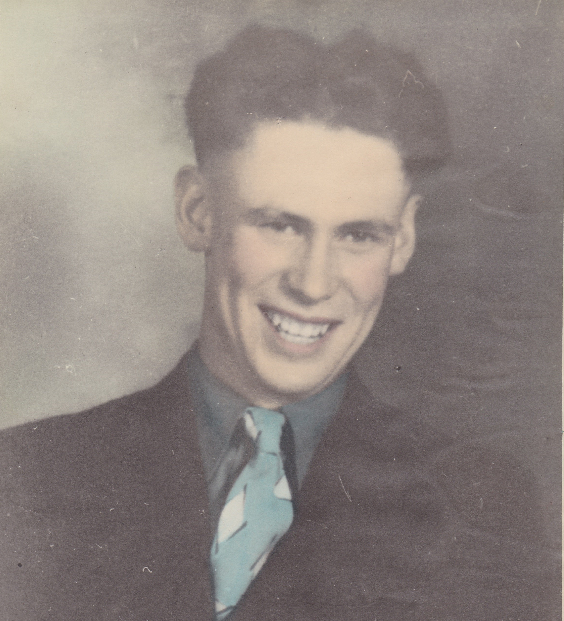
Vern is the middle child of Tena (Thompson) and Joe Rhombs. Like his siblings, he was born on the Thompson farm - just west of Hoven, SD. He died very early in life (nearly 53 years old). He moved with the Rhombs family to their farm south of Lebanon, SD, in 1920. This must have been a significant change for the whole family, including Vern, who was a toddler at the time. I'm sure that he was not much help, especially to his mother who was also dealing with his infant brother (Robert). Their sister, Annie, who was somewhat older must have been charged with helping to watch over Vern during the move.
I knew Vern through occasional summer visits to the farm in the 1950s, 1960s, and 1970s. Since the death of his father in 1940, Vern had been responsible for operation of the family farm, where he lived with his mother. What I remember from these visits can be boiled down to the following.
Vern was good with machinery, which had become essential for farming as Vern grew up. According my father, Vern preferred machines to animals (which were my father's preference). Having said this, Vern did keep animals for diversification - cattle (Angus), sheep, chickens, etc. His mother (Tena) kept a significant garden. Vern seems to have foreseen the trend away from small farms to much larger ones.
Vern loved to drive fast! His favorite vehicles were by Chevrolet and GMC. In fact, after Vern's death, I became the keeper of a 1954 Chevy that Vern had bought in Faulkton, SD.
Vern was gregarious. He was well-known at local dances and at roller skating events. People that were children at the time remember dancing/skating with Vern.
Vern was a collector! He would attend farm sales and buy LOTS of things, which were stored in out-buildings and across a field just east of the farmhouse. After his death, we had a multiple-day sale/auction to liquidate much of this, and, after Tena's death, we had another sale that included many items that had not been sold in the previous sale.
Cataracts were a serious problem for Vern. They started to affect him rather early in life. In spite of this, he was a great shot and enjoyed firearms. I still do not understand how he was able to shoot as well as he did. I am pleased to be the owner of one of his rifles and a handgun. It is a shame that Vern did not have access to medical techniques available now.
Here is a tractor story involving Vern by my cousin. - ". . . my most intriguing Farmall story is how my uncle came to purchase his first Farmall M. During WWII it was nearly impossible to buy a new tractor. You could get your name on a waiting list and wait for months or even years to get one. My uncle, Vern, saw a sale bill for a farm estate in a neighboring town that included an M that was only one year old. A gentleman had waited for a year on the waiting list and shortly after he got the tractor, he unfortunately died of a heart attack. Uncle Vern went to the sale and when they got to the M, the bidding was fast and furious. Government price controls were on and when it got to the price limit of a new tractor, the auctioneer stopped the sale. The auctioneer asked how many bidders would pay the price of a new tractor (which I believe was $1,000) and a total of 10 bidders raised their hands. At that point they asked each of the bidders to write their name on a slip of paper, which they placed in a hat. It was Uncle Vern’s lucky day and his name was drawn. He was, however, followed part way home by another bidder offering him a drink of whiskey and any price he wanted for the tractor (black market). Vern kept the tractor until he passed in the 70s and it was sold at his farm auction, like thousands of others just as they are today."
Anna Rhombs
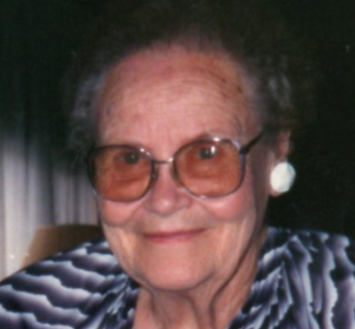
If you are lucky, you will encounter someone who offers you unconditional support. Anna Rhombs Comeau (Annie) was such a person in my life. She offered the same to my wife and son, and as a result we had some thoroughly enjoyable summer visits to her home in Gettysburg. We shared simple things - fireworks at the Missouri River, fireworks displays by my son in her driveway, drives through the local area, a trip to Pierre, the COLD Gettysburg pool, visits with her neighbors, etc.
On the trip to Pierre, I was driving about 5 mph above the posted speed limit and I was stopped by a trooper. He just gave me a verbal warning, but Annie was mad at him. This was an example of the her support.
When I was much younger, I also visited her farm - sometimes alone, sometimes with my family. It was always a great experience and a chance to learn a little about farm life. She and her husband Leo Comeau and their son Bob were super hosts. I had sometimes had access to a horse (e.g., borrowed from the Nagel farm). There were lots of farm animals - sheep, pigs, chickens, dogs, cats, etc. As I got older there were also rifles and pistols, and forays into the pastures and stands of trees in search of gophers and rabbits. Only once was my mother upset with me after one of my solo visits. She was upset because I returned home heavier than when I had left and my clothes no longer fit well. She had to buy bigger clothes for me for that school year.
There are many other stories about butchering chickens, taking ticks off dogs, castrating pigs, etc. Not normal fare for a kid from the city!
Annie was the first child of Joe and Tena (Thompson) Rhombs. She was born 1911 at a farm a few miles west of Hoven, SD. She was the big sister to my father, who was born about nine years later. I think that she played a big supporting role in my father's life. I know that there were times when dad did not manage his money well at college and Annie provided loans/gifts to him.
After marrying Leo Comeau, they moved onto the farm that I mention above. It was just north of Gettysburg, SD. The attached document from their son Robert describes life on the farm in better detail than I ever could.
Shirley Bates
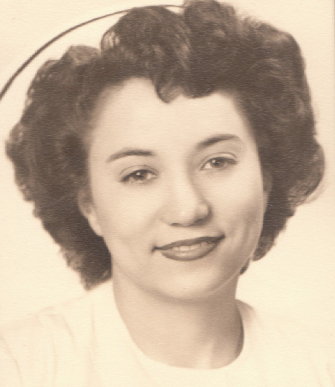
When I think of Shirley, I think of liveliness, fast motion, fun, smiles, attentiveness, and kindness. We did not visit her often, but when we did I was treated to her friendliness. I always enjoyed her company. Here is an obituary, published shortly after her death.
Obituary:
Shirley Mae Bates was born Oct. 6, 1928, to Harry G. and Marian (Loy) Bates on the family farm in Perkins County, S.D. She attended country schools and graduated from Gettysburg High School. Shirley moved to Aberdeen, where she attended three years of nursing school and became a registered nurse. Shirley married Rex Nelson June 6, 1953, in Rapid City, S.D. They made Aberdeen their home, where she was employed with St. Luke's Hospital for 28 years and then as the state health nurse for 15 years before retiring. Shirley was a member of the First United Methodist Church and the United Methodist Women. She loved to play bridge and enjoyed meeting her nursing classmates for lunch several times every year. Her parents preceded her in death. Grateful for having shared her life is her husband, Rex of Aberdeen; her daughter, Kristie (Wayne) Frederick of Red Wing, Minn.; three grandchildren, Shawn, Shannon and Ashley Frederick; one sister, Velma (Bob) Rombs of Sarasota, Fla.; and one brother, Dennis (Darlene) Bates of Herreid, S.D. All of Shirley's co-workers from Avera St. Luke's Hospital will be considered honorary pallbearers. Following the memorial service, everyone is welcome to join the family for lunch, served by the United Methodist Women at the church.
Shirley's daughter, Kristie, has also provided the following, which is inspired by the "boxer shorts ironing" story above. -
My mother also ironed everything: sheets, underwear and my dad's work clothes. But they came by ironing honestly - you see grandma (Marian Loy) also ironed everything. As a gift from her second husband, Christ Snortland, she got a commercial ironing machine. You could lay your whole sheet in it. She loved it!
The words I would use to describe my mother are kind, loving, hard worker, funny, caring, smart. She was loved by many, and she never complained even when her health went bad. I admired her.
Dennis Bates
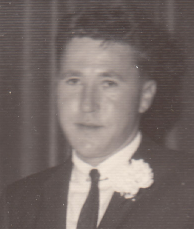
Of all of my uncles and aunts, I know the least about Dennis. I do remember that he visited my family in Ft. Lauderdale, FL, after having broken a leg while parachuting. The following obituary describes some parts of his life.
Obituary:
Dennis A. Bates (known simply as “Bates”) was born May 22, 1938, to Harry and Marion Bates. The youngest of three children, Shirley Nelson (Aberdeen, SD -Deceased).
He married Darlene F. Berndt on Oct. 12, 1962, at the Herreid Baptist Church and they recently celebrated 52 years of marriage.
Bates enlisted in the U.S. Army and will be remembered as a Green Beret with the Special Forces. He was stationed in Ft. Brag, North Carolina and served his country with pride. He was honorably discharged and returned home to Herreid in 1961.
Bates' strong working career included employment with Perman Elevator, Herreid Concrete, Herreid Equity, and 17 years with the DOT for the State of SD. Retiring to the Missouri River, he also was a fishing guide for the Point of View.
Bates was very active in the Herreid Community for 53 years.
He was volunteer for the Herreid Volunteer Fire Department (Fire Chief for multiple terms), the Campbell County Ambulance (the 54th certified EMT in the State), the Herreid Economic Development, the Boosters Club, the Campbell County Wildlife, and the Jaycees. He as also proud member of the Jacob A. Henrich American Legion Post 170.
Fishing was his passion.
His handle was “Jayhawker”, and it is legend to believe that the Corp of Engineers re-plated the Missouri River after Bates ‘re-named’ many fishing spots he favored. New sites like “double-tree, single tree, thin ice, and many more. His endless humor was shared with everyone.
He is survived by his fishing and card-playing buddies, his EMS and firefighter partners, his community of friends and a loving family.
Burial will be in the Fairview Cemetery in Herreid under the direction of Kesling Funeral Home of Mobridge, SD.
Funeral services for Dennis Bates age 76 of Herreid, SD will be Saturday at 2:00 PM at the Herreid Baptist Church. Pastor Don Hill officiating.
Backlinks:
281connections Wiki:South Dakota Families:Memorials